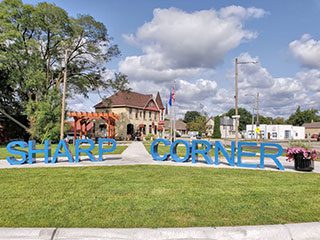2023 Placemaking Award recognizes revitalization success
Watertown’s Main Street, once laden with historical charm dating to the 19th century, had declined by the early 2000s. Age had faded its architectural beauty, vacancies had drained the downtown of its vibrancy, and it lacked a central gathering spot.
Set on the Rock River, the downtown faced steep challenges, and officials sought ways to unlock the Main Street’s true potential. In the 1990s, the city set up a historical district; the city joined the Wisconsin Main Street Program in 2000. Finally, in 2014, the city adopted the Riverfront and Downtown Redevelopment District, which led to formation of an energized public-private partnership intent on driving dormant ideas of revitalization to reality.

Finding direction, forging collaboration
The plan revealed that 46 upper floors in the historic district were empty. There were not enough residential and lodging options, and the area lacked a central plaza to attract visitors and host events.
In response to the plan, officials established the Watertown Redevelopment Authority—which, in turn, established revolving loan and grant funds to incentivize private investment downtown and created a downtown tax incremental financing district. Over the past decade, the redevelopment authority has awarded more than $1 million in grants and loans—funding that came from public funds and a consortium of local banks—to 16 downtown businesses.
On a parallel track, the public library launched a $10 million renovation and expansion campaign along with the Greater Watertown Community Health Foundation and Watertown Family Connections—and the drive to create a town square began. The Bentzin Family Town Square, a $4.7 million project, was completed in 2023, with 80% of the funding coming from private sources. The square includes a public space, a water feature, and an improved riverwalk. The project also received support from a Wisconsin Department of Natural Resources (DNR) grant and WEDC’s Brownfields and Community Development Investment grant programs. The refreshed and expanded library also opened its doors, serving nearly a quarter-million visitors in its first 18 months. In the commercial district, the Watertown Main Street organization awarded 65 sign and façade grants. Beyond that, 97 property improvement projects were completed downtown, some creating new upper-floor housing units.
Local businesses and out-of-town private investors joined in the revitalization. The long-vacant Schempf Department Store was converted to mixed-use retail and commercial space with the help of Historic Preservation Tax Credits. Twenty-one businesses tapped into WEDC’s Main Street Bounceback Grants to occupy formerly vacant spaces. Watertown also cleaned up the brownfield of a former gas station and realigned a dangerous intersection, creating Sharp Corner Park and adding green space.
“Coordination between the library and plaza, and between individual property owners and retail businesses, to enhance and improve the district experience resulted in an enhanced experience for visitors to the district,” said WEDC Senior Downtown Development Director Errin Welty.
Looking toward a brighter future
Watertown’s success in refreshing its downtown inspired the community. About $350,000 in private donations poured into its Future Fund, which will support programming and operation of the Bentzin Family Town Square and further business expansion downtown.
The community’s efforts garnered the Mid-America Economic Development Council’s 2023 Placemaking Award—a recognition Watertown Mayor Emily McFarland said was the culmination of a community working together toward a common goal.
“The transformation of our downtown has been carefully planned and implemented, both by the city and by our community members and partners,” she said. “We can see and feel the change, and it is validating to know that impact can be felt regionally.”
Revitalization efforts have increased the historic district’s average property values by 180%, and foot traffic grew by a third, local officials say. Beyond quantifiable results, the sense of community has grown and strengthened. Construction on a 101-unit luxury apartment complex is underway near the Town Square, and efforts to enhance the riverwalk continue.
“Dedicated and consistent effort spanning more than a decade requires strong institutional leaders and community support,” Welty added. “That support has paid off.”


